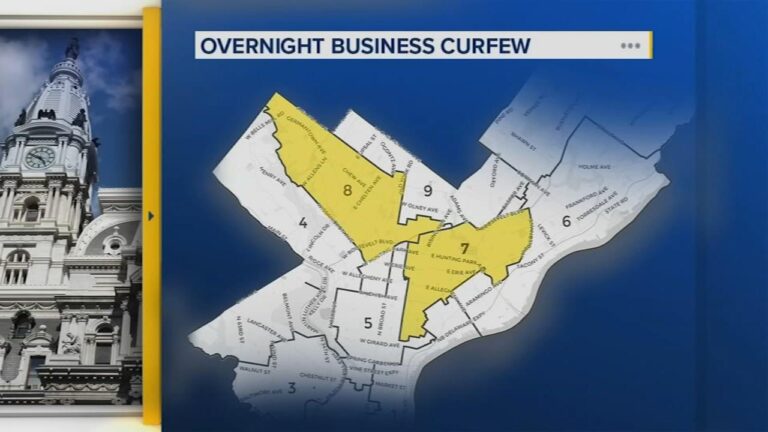Philadelphia Businesses Demand Repeal of Restrictive Curfew Laws
Entrepreneurs throughout Philadelphia are rallying to urge the City Council to overturn the newly implemented curfew regulations that limit operating hours in prominent commercial zones. Opponents contend that these restrictions jeopardize the fragile economic rebound, disproportionately burdening small business owners who depend on evening and late-night customers. Key industries such as dining establishments, nightlife venues, and entertainment hubs warn that the curfew could lead to significant job losses and permanent shutdowns if left unmodified.
The business community has highlighted several critical issues stemming from the curfew:
- Revenue decline: Evening sales constitute a major portion of profits.
- Employment reductions: Shortened hours may force layoffs or reduced shifts.
- Tourism downturn: Philadelphia’s vibrant nightlife attracts visitors who fuel the local economy.
Advocacy organizations like the Institute for Justice advocate for solutions that harmonize public safety with economic sustainability, suggesting alternatives such as bolstered community policing and voluntary compliance agreements instead of rigid curfews.
| Sector | Projected Impact | Recommended Alternatives |
|---|---|---|
| Restaurants | Estimated 35%-45% drop in revenue | Extended outdoor dining, flexible closing times |
| Bars & Nightclubs | Loss of late-night clientele | Community engagement initiatives |
| Entertainment Venues | Event cancellations, lower attendance | Collaborative efforts with law enforcement |
Financial Repercussions of Curfew on Philadelphia Entrepreneurs
Philadelphia’s small business owners are increasingly alarmed by the financial strain caused by the city’s new curfew ordinance, which restricts operating hours during peak evening periods. Many argue that the policy disrupts established consumer habits and disproportionately impacts smaller enterprises that rely heavily on nighttime revenue streams. According to recent data from the Institute for Justice, affected businesses have experienced an average sales decline of approximately 15% per week, raising concerns about long-term viability and potential closures.
The broader economic consequences extend beyond immediate revenue losses, affecting employment and neighborhood vibrancy. Stakeholders have voiced several pressing concerns:
- Staff reductions: Businesses may cut jobs or reduce employee hours.
- Lower foot traffic: Decreased customer presence harms surrounding businesses.
- Hindered business growth: The curfew discourages new ventures from launching in affected areas.
| Business Category | Average Revenue Decline | Employment Effects |
|---|---|---|
| Restaurants & Bars | 20% | One in five employees laid off |
| Retail Outlets | 12% | Fewer part-time jobs available |
| Entertainment Facilities | 25% | Temporary shutdowns reported |
Legal Opposition and Policy Reversal Efforts Led by Institute for Justice
In response to the curfew ordinance, Philadelphia’s business community has mobilized, with the Institute for Justice at the forefront of legal challenges. The nonprofit organization argues that the curfew represents an unconstitutional overreach that infringes on business owners’ rights to operate freely. They contend that the law is applied unevenly across neighborhoods and lacks sufficient public consultation, exacerbating the hardships faced by small businesses still recovering from the pandemic’s economic fallout.
Core legal arguments presented by the Institute for Justice include:
- Unequal enforcement violating the principle of equal protection under the law.
- Disproportionate harm to small businesses striving to regain stability.
- Insufficient transparency and community involvement during the legislative process.
| Business Type | Curfew Hours | Estimated Monthly Revenue Loss |
|---|---|---|
| Restaurants | 10 PM to 5 AM | $350,000 |
| Retail Stores | 9 PM to 5 AM | $200,000 |
| Night Markets | 8 PM to 5 AM | $500,000 |
While legal proceedings continue, the Institute is also engaging with policymakers to advocate for rescinding the curfew. They propose alternative strategies that address safety concerns without imposing sweeping restrictions, emphasizing collaboration between city officials and business stakeholders to foster both security and economic growth.
Collaborative Solutions Preferred Over Restrictive Curfew Policies
In light of the backlash against the curfew, many business leaders and community advocates have put forward cooperative approaches that prioritize partnership over prohibition. These initiatives aim to create a thriving business environment while simultaneously addressing public safety challenges. By encouraging dialogue and joint problem-solving among law enforcement, neighborhood groups, and business owners, these alternatives seek to mitigate risks without stifling economic activity.
Key components of these collaborative proposals include:
- Enhanced communication channels between businesses and city officials.
- Voluntary safety programs initiated and managed by business owners.
- Community mediation forums to resolve conflicts before escalation.
- Data-driven approaches to identify and address problem areas without penalizing all establishments.
| Initiative | Objective | Anticipated Benefit |
|---|---|---|
| Joint Safety Task Force | Unites stakeholders for shared strategies | Reduces incidents through cooperation |
| Business-Driven Nightlife Standards | Empowers owners to establish guidelines | Improves self-regulation and compliance |
| Community Mediation Panels | Addresses disputes without formal penalties | Builds trust and lowers tensions |
Conclusion: Balancing Economic Recovery and Public Safety in Philadelphia
As Philadelphia’s business sector continues to navigate the post-pandemic economic landscape, the debate over the city’s curfew ordinance highlights the delicate balance between ensuring public safety and fostering economic resilience. The Institute for Justice’s active role underscores the significant implications such policies have on local entrepreneurs and the broader economy. With growing pressure on City Council to revisit the legislation, the coming weeks will be pivotal in shaping a regulatory framework that supports both community well-being and the vitality of Philadelphia’s diverse commercial districts.


